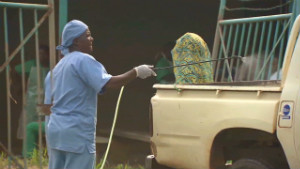KAMPALA, 2 August
2012 (IRIN) - Health officials in Uganda's western Kibaale District are
struggling to deal with an outbreak of Ebola, as the number of suspected cases
stretches local health systems.
The Ugandan government has so far
reported 16 suspected Ebola deaths; four have been confirmed by testing carried
out at the Uganda Virus Research Institute in Entebbe. The Ministry reports
another 22 suspected cases, all in Kibaale District.According to the
Kibaale District Ebola Taskforce (KDET), reports of possible Ebola cases in the
west continue to rise: health officials reported that they were following up on
176 people thought to have been in contact with infected patients on 31 July, up
from 40 suspected contacts the day before. The disease is transmitted through
direct contact with an infected person or their body fluids such as blood and
sweat.
Meanwhile, a shortage of trained health workers has affected
containment efforts; just 56 percent of health worker positions in the country's
public health sector are filled.
Burials in the affected communities
have been taken over by KDET, whom the ministry has supplied with vehicles,
though there have been delays in providing them with fuel. The ministry has also
set up a telephone hotline for citizens to report suspected
cases.
Though these efforts have been boosted by the Uganda Red Cross,
Médecins Sans Frontières (MSF), the US Centres for Disease Control, the UN World
Health Organization and others, KDET chairperson Steven Byaruhanga said
suspected cases are quickly outpacing relief efforts.
"At sub-county
health centres, we are getting reports that they are shying away from handling
patients because they don't have protective gear," he said.According
to Byaruhanga, the district is asking for the equivalent of US$334,000 to
upgrade Kagadi Hospital - the centre of the outbreak - to increase awareness
messages and to support traumatized health workers.
"Some of them are
demoralized, others are stigmatized because their colleague has passed away," he
said. "They need at least some
motivation."
DilapidatedByaruhanga said the facility was
already dilapidated when the outbreak began, citing an irregular water supply
and electricity, a broken sewer system and no medical incinerator.
Local
media reports this week said patients at the hospital had protested about the
lack of food and water, and wanted to leave.
The Ministry of Health is
requesting emergency supplies from the Prime Minister’s Office - responsible for
disaster preparedness - as well as support from developing partners such as MSF,
who are helping to build isolation centres.
On top of that, the ministry
has access to a 2.5 billion Uganda shilling ($1 million) reserve fund for
emergencies, according to its permanent secretary, Asuman Lukwago. "We can
frontload that money and use it early," Lukwago said.
The outbreak was
reported by the government on 28 July, but the first case is thought to have
appeared weeks earlier.
The death of a clinical officer from Kagadi in
Kibaale District who was taken to Mulago Hospital in the capital, Kampala,
sparked fears of an outbreak in the city, but health officials say seven health
workers being held in isolation at the hospital have not shown any symptoms, 11
days after their potential exposure. By 1 August, no further cases had been
reported in the capital.
Delayed responseThe nearly
month-long delay in identifying the current outbreak was in part due to the
spiritual beliefs of the community. According to Byaruhanga, the virus wiped out
nine members of one family, who believed they were "cursed". He added that the
delay also erased any real hope of tracing the source of
infection."It blindfolded other research that would have taken
place," he said.
The UN World Health Organization has identified the
strain in Kibaale as Ebola-Sudan, the same
strain responsible for some 425 infections and 224 deaths in Uganda in 2000-2001
and one death in 2011; another strain, Ebola-Bundibugyo - named after a
western Ugandan district - killed some 42 people in the country in
2007-2008.
Byaruhanga also said health officials did not recognize the
Sudan strain, which can achieve a 70 percent fatality rate, as it presented
differently from the previous Bundibugyo strain, with a 30-40 percent fatality
rate; patients presented with fever and vomiting rather than the more typical
haemorrhaging usually associated with Ebola.
"We thought it was a
strange disease because the symptoms first of all were not like the previous
Ebola - that's why people were not cautious about it," he said. http://www.irinnews.org/Report/96010...a-numbers-rise
http://www.irinnews.org/Report/96010...a-numbers-rise







 The South Sudan's Ministry of Health and the World Health Organization (WHO) said on Tuesday that they were stepping up surveillance following an outbreak of the deadly Ebola virus in neighboring Uganda.
The South Sudan's Ministry of Health and the World Health Organization (WHO) said on Tuesday that they were stepping up surveillance following an outbreak of the deadly Ebola virus in neighboring Uganda.